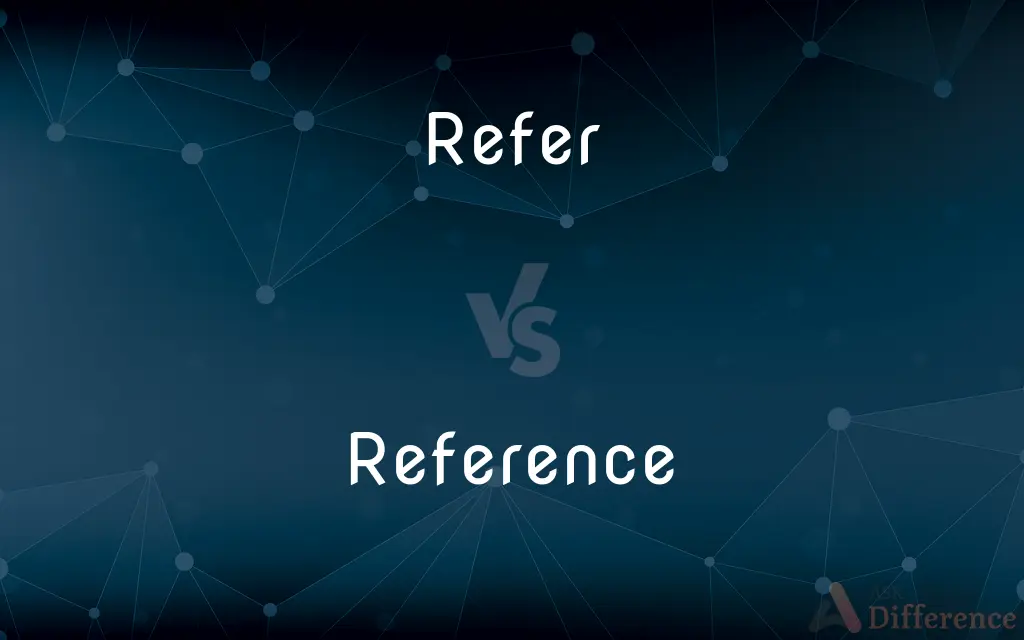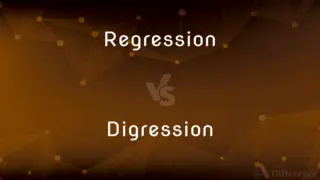Refer vs. Reference — What's the Difference?
By Tayyaba Rehman & Fiza Rafique — Updated on March 15, 2024
Refer implies directing someone to a source for information, while reference involves citing or mentioning a source directly.

Difference Between Refer and Reference
Table of Contents
ADVERTISEMENT
Key Differences
To refer someone to something means to direct or point them towards a specific piece of information, source, or material for further reading or examination. It's an act of guiding someone to where they can find the information they seek. On the other hand, to reference something means to explicitly cite, quote, or mention it within a work or conversation. It involves bringing information into the present context directly from the source.
When you refer, you are essentially saying, "Go look at this for more details." It's a process of delegation, suggesting that the information or detail needed can be found in another location. In contrast, referencing is akin to saying, "This information from a specific source supports my point." It's an act of integration, incorporating external information or evidence to bolster or clarify your current discussion or argument.
References are often formal and follow specific formats in academic, legal, or professional documents, indicating a structured way to acknowledge the sources of information, ideas, or data. Referrals, however, can be informal, such as recommending a book or website in conversation, or formal, such as referring a patient to a specialist or referring to another document in professional communication.
The choice between referring and referencing depends on the intent and context. If the goal is to encourage someone to explore a topic more deeply on their own, you would refer them to a source. If the aim is to support your statements or ideas with authoritative backing within your text or speech, you would reference specific works or authors.
Referring and referencing both serve to connect ideas and information but do so in different ways. Referring directs someone elsewhere to find information, while referencing brings the information into the current discussion. Both practices enrich communication and knowledge sharing by linking to additional sources, but they cater to different needs and scenarios in the exchange of information.
ADVERTISEMENT
Comparison Chart
Purpose
To guide someone to a source
To cite or mention a source directly
Action
Directing elsewhere
Citing or quoting within the current work
Formality
Can be informal or formal
Often formal, following specific formats
Context
Recommending further exploration
Supporting or clarifying points made
Representation
Indirect, points to the location of information
Direct, brings information into the current context
Compare with Definitions
Refer
To send or direct someone to a person or place for treatment, help, or consultation.
The doctor referred the patient to a specialist.
Reference
To cite as authority or example.
The author references several studies in her book.
Refer
To delegate a matter to someone for decision-making.
The committee referred the proposal to a subcommittee for further evaluation.
Reference
To use or adapt from a source.
The filmmaker referenced classic movies in her new work.
Refer
To direct attention to a source of information.
I will refer you to the study that outlines these findings.
Reference
To provide a list of sources cited or consulted.
The research paper includes a reference section at the end.
Refer
To recommend someone or something for consultation.
Can you refer a good book on this topic?
Reference
To mention or quote directly.
During his speech, he referenced the famous quote by Martin Luther King Jr.
Refer
To mention or allude to.
The professor referred to the latest research during the lecture.
Reference
To link or associate with something.
The symbol references a well-known historical event.
Refer
To direct to a source for help or information
Referred her to a heart specialist.
Referred me to his last employer for a recommendation.
Reference
Reference is a relationship between objects in which one object designates, or acts as a means by which to connect to or link to, another object. The first object in this relation is said to refer to the second object.
Refer
To submit (a matter in dispute) to an authority for arbitration, decision, or examination.
Reference
The act of referring to something
Filed away the article for future reference.
Refer
To direct the attention of
I refer you to the training manual.
Reference
Significance for a specified matter; relation or relationship
Her speeches have special reference to environmental policy.
Refer
To assign or attribute to; regard as originated by.
Reference
Meaning or denotation
The reference of the word “lion” is to a kind of wild cat.
Refer
To assign to or regard as belonging within a particular kind or class
Referred the newly discovered partita to the 1600s.
Reference
A mention of an occurrence or situation
Made frequent references to her promotion.
Refer
To relate or pertain; concern
Questions referring to yesterday's lecture.
Reference
A note in a publication referring the reader to another passage or source.
Refer
To serve as a descriptor or have as a denotation
The word chair refers to a piece of furniture.
Reference
The passage or source so referred to.
Refer
To speak or write about something briefly or incidentally; make reference
Referred during our conversation to several books he was reading.
Reference
A work frequently used as a source.
Refer
To turn one's attention, as in seeking information
Refer to a dictionary.
Reference
A mark or footnote used to direct a reader elsewhere for additional information.
Refer
(transitive) To direct the attention of (someone toward something)
The shop assistant referred me to the help desk on ground floor.
Reference
Submission of a case to a referee.
Refer
(transitive) To submit to (another person or group) for consideration; to send or direct elsewhere.
He referred the matter to the principal.
To refer a patient to a psychiatrist
Reference
Legal proceedings conducted before or by a referee.
Refer
To place in or under by a mental or rational process; to assign to, as a class, a cause, source, a motive, reason, or ground of explanation.
He referred the phenomena to electrical disturbances.
Reference
A person who recommends another or who can vouch for another's fitness or qualifications, as for a job.
Refer
(intransitive) To mention (something); to direct attention (to something)
To explain the problem, the teacher referred to an example in another textbook.
Reference
A statement about a person's qualifications, character, and dependability.
Refer
To make reference to; to be about; to relate to; to regard; to allude to.
The recipe referred to several unusual ingredients.
Reference
To supply (a text) with references
The author hadn't adequately referenced the third chapter, so the copyeditor suggested adding more citations. This article is thoroughly referenced with up-to-date sources.
Refer
(grammar) To be referential to another element in a sentence.
Reference
To cite as a reference
The monograph doesn't reference any peer-reviewed articles.
Refer
To point to either a specific location in computer memory or to a specific object. to
In C, the pointer obtained by
&a refers to the variable a.Reference
Usage Problem To mention or allude to
The comedian's monologue referenced many Hollywood stars.
Refer
Required to resit an examination.
Smith's marks in the finals were unsatisfactory and he was referred.
Reference
A relationship or relation (to something).
Refer
(journalism) A blurb on the front page of a newspaper issue or section that refers the reader to the full story inside the issue or section by listing its slug or headline and its page number.
Reference
A measurement one can compare (some other measurement) to.
Refer
To carry or send back.
Reference
Information about a person, provided by someone (a referee) with whom they are well acquainted.
Refer
Hence: To send or direct away; to send or direct elsewhere, as for treatment, aid, information, decision, etc.; to make over, or pass over, to another; as, to refer a student to an author; to refer a beggar to an officer; to refer a bill to a committee; a court refers a matter of fact to a commissioner for investigation, or refers a question of law to a superior tribunal.
Reference
A person who provides this information; onlyn in UK English: a referee.
Refer
To place in or under by a mental or rational process; to assign to, as a class, a cause, source, a motive, reason, or ground of explanation; as, he referred the phenomena to electrical disturbances.
I'll refer me to all things sense.
Reference
A reference work.
Refer
To have recourse; to apply; to appeal; to betake one's self; as, to refer to a dictionary.
In suits . . . it is to refer to some friend of trust.
Reference
(attributive) That which serves as a reference work.
Reference Dictionary of Linguistics
Refer
To have relation or reference; to relate; to point; as, the figure refers to a footnote.
Of those places that refer to the shutting and opening the abyss, I take notice of that in Job.
Reference
The act of referring: a submitting for information or decision.
Refer
To carry the mind or thought; to direct attention; as, the preacher referred to the late election.
Reference
(semantics) A relation between objects in which one object designates, or acts as a means by which to connect to or link to, another object.
Refer
To direct inquiry for information or a guarantee of any kind, as in respect to one's integrity, capacity, pecuniary ability, and the like; as, I referred to his employer for the truth of his story.
Now to the universal whole advert:The earth regard as of that whole a part.
Reference
(academic writing) A short written identification of a previously published work which is used as a source for a text.
Refer
Make reference to;
His name was mentioned in connection with the invention
Reference
(academic writing) A previously published written work thus indicated; a source.
Refer
Have to do with or be relevant to;
There were lots of questions referring to her talk
My remark pertained to your earlier comments
Reference
(computing) An object containing information which refers to data stored elsewhere, as opposed to containing the data itself.
Refer
Think of, regard, or classify under a subsuming principle or with a general group or in relation to another;
This plant can be referred to a known species
Reference
A special sequence used to represent complex characters in markup languages, such as
™ for the ™ symbol.Refer
Send or direct for treatment, information, or a decision;
Refer a patient to a specialist
Refer a bill to a committee
Reference
(obsolete) Appeal.
Refer
Seek information from;
You should consult the dictionary
Refer to your notes
Reference
To provide a list of references for (a text).
You must thoroughly reference your paper before submitting it.
Refer
Have as a meaning;
`multi-' denotes `many'
Reference
To refer to, to use as a reference.
Reference the dictionary for word meanings.
Reference
To mention, to cite.
In his speech, the candidate obliquely referenced the past failures of his opponent.
Reference
(programming) To contain the value that is a memory address of some value stored in memory.
The given pointer will reference the actual generated data.
Reference
The act of referring, or the state of being referred; as, reference to a chart for guidance.
Reference
That which refers to something; a specific direction of the attention; as, a reference in a text-book.
Reference
Relation; regard; respect.
Something that hath a reference to my state.
Reference
One who, or that which, is referred to.
Reference
The act of submitting a matter in dispute to the judgment of one or more persons for decision.
Reference
Appeal.
Reference
A remark that calls attention to something or someone;
She made frequent mention of her promotion
There was no mention of it
The speaker made several references to his wife
Reference
A short note recognizing a source of information or of a quoted passage;
The student's essay failed to list several important citations
The acknowledgments are usually printed at the front of a book
The article includes mention of similar clinical cases
Reference
An indicator that orients you generally;
It is used as a reference for comparing the heating and the electrical energy involved
Reference
A book to which you can refer for authoritative facts;
He contributed articles to the basic reference work on that topic
Reference
A formal recommendation by a former employer to a potential future employer describing the person's qualifications and dependability;
Requests for character references are all to often answered evasively
Reference
The most direct or specific meaning of a word or expression; the class of objects that an expression refers to;
The extension of `satellite of Mars' is the set containing only Demos and Phobos
Reference
The act of referring or consulting;
Reference to an encyclopedia produced the answer
Reference
A publication (or a passage from a publication) that is referred to;
He carried an armful of references back to his desk
He spent hours looking for the source of that quotation
Reference
The relation between a word or phrase and the object or idea it refers to;
He argued that reference is a consequence of conditioned reflexes
Reference
Refer to;
He referenced his colleagues' work
Common Curiosities
Can you refer and reference the same source?
Yes, you can first refer someone to a source for further reading, and also reference specific information from that source in your work.
How do you use a reference?
You use a reference by citing or mentioning it in your work to support your arguments, provide evidence, or acknowledge the source of ideas or data.
Why is referencing important?
Referencing is crucial for acknowledging the work of others, avoiding plagiarism, supporting your arguments, and enabling readers to locate the sources.
What does it mean to refer in writing?
To refer in writing means to direct readers to another document, book, article, or source for additional information or context.
What is the role of a reference in research?
In research, references validate claims, provide context, and situate the work within the existing body of knowledge.
Can a reference be informal?
While references are typically formal, especially in academic and professional contexts, casual conversations can include informal references to books, articles, or other materials.
Is referring someone the same as recommending?
Referring can involve recommending, but it specifically means directing someone to a source for information, whereas recommending has a broader connotation of endorsing or suggesting something for its value.
How do digital sources change referring and referencing?
Digital sources have made referring and referencing more accessible but require careful attention to the accuracy and reliability of online information.
How do references differ in various formats?
References differ in formatting rules (such as APA, MLA, or Chicago style), which dictate how to list authors, titles, publication dates, and other details.
What makes a good reference?
A good reference is relevant, authoritative, and accurately cited, providing readers with a reliable path to further information.
What is a referral in a professional context?
In a professional context, a referral can mean directing a client or patient to another professional for specialized services.
How can I improve my referencing skills?
You can improve your referencing skills by familiarizing yourself with various citation styles, practicing accurate citation, and using citation management tools.
Do all fields use the same referencing styles?
No, different academic and professional fields prefer specific citation styles, such as APA for psychology and social sciences, MLA for humanities, and Chicago for history and some sciences.
Why might someone prefer to refer rather than reference?
Someone might prefer to refer to encourage independent exploration or when detailed citation is unnecessary for the context of the discussion.
What's the difference between a bibliography and a reference list?
A bibliography may include all materials consulted in the research process, while a reference list includes only those directly cited in the work.
Share Your Discovery

Previous Comparison
Regression vs. Digression
Next Comparison
Tiger vs. KangarooAuthor Spotlight
Written by
Tayyaba RehmanTayyaba Rehman is a distinguished writer, currently serving as a primary contributor to askdifference.com. As a researcher in semantics and etymology, Tayyaba's passion for the complexity of languages and their distinctions has found a perfect home on the platform. Tayyaba delves into the intricacies of language, distinguishing between commonly confused words and phrases, thereby providing clarity for readers worldwide.
Co-written by
Fiza RafiqueFiza Rafique is a skilled content writer at AskDifference.com, where she meticulously refines and enhances written pieces. Drawing from her vast editorial expertise, Fiza ensures clarity, accuracy, and precision in every article. Passionate about language, she continually seeks to elevate the quality of content for readers worldwide.
















































